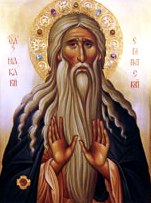Macarius of Egypt
Egyptian Christian monk and hermit
Macarius of Egypt (c. 300 – 391) was an Egyptian Christian monk and hermit. He is also known as Macarius the Elder, Macarius the Great and The Lamp of the Desert.

| This article about a religious leader is a stub. You can help out with Wikiquote by expanding it! |
From Apophthegmata Patrum
edit- Wortley, John (2014). Give Me a Word: The Alphabetical Sayings of the Desert Fathers. Yonkers, New York: St. Vladimir's Seminary Press. ISBN 978-0-88141-497-4.
- Ὁ αὐτὸς ἀββᾶς Μακάριος͵ ἐν Αἰγύπτῳ ὢν͵ εὗ ρεν ἄνθρωπον ἔχοντα κτῆνος καὶ συλοῦντα τὰς χρείας αὐτοῦ· καὶ αὐτὸς ὡς ξένος παραστὰς τῷ συλοῦντι͵ συνεγέμου τὸ κτῆνος͵ καὶ μετὰ πολλῆς ἡσυχίας προέπεμπεν αὐτὸν͵ λέγων͵ ὅτι Οὐδὲν εἰσηνέγκαμεν εἰς τὸν κόσμον͵ δῆλον ὅτι οὐδὲ ἐξενεγκεῖν τι δυνάμεθα. Ὁ Κύριος ἔδωκεν· ὡς αὐτὸς ἠθέλη σεν͵ οὕτως καὶ ἐγένετο. Εὐλογητὸς Κύριος ἐπὶ πᾶσιν
- When the same Abba Macarius was in Egypt he found somebody who had a beast of burden carrying off his things. Standing beside the robber as though he were a stranger, he helped him load up the beast then sent him on his way in great hesychia, saying: “‘We brought nothing into this world and it is clear that neither can we carry anything out’ [1 Tim 6:7]. ‘The Lord has given and it has transpired as he willed it to; blessed be the Lord in all things’ [see Job 1:21].”
- Saying 18
- When the same Abba Macarius was in Egypt he found somebody who had a beast of burden carrying off his things. Standing beside the robber as though he were a stranger, he helped him load up the beast then sent him on his way in great hesychia, saying: “‘We brought nothing into this world and it is clear that neither can we carry anything out’ [1 Tim 6:7]. ‘The Lord has given and it has transpired as he willed it to; blessed be the Lord in all things’ [see Job 1:21].”
Quotes
editDisputed
edit- Fifty Spiritual Homilies
Fifty Spiritual Homilies was formerly ascribed to Macarius of Egypt, but Johannes Quasten, Patrology Vol. 3: The golden age of Greek patristic literature, from the Council of Nicaea to the Council of Chalcedon, (1960) suggested a different person from Upper Mesopotamia.
- As anyone who watches a bird flying may wish that he himself could fly, yet still he cannot fly, being without wings, so also a man may have the will to be pure, to be without blame and spotless, to be always without evil and in communion with God, yet he does not truly have the power. To fly into the divine air and enjoy the liberty of the Holy Spirit (2 Cor 3:18) may be one's desire, but, if he does not have wings given him, he cannot. Let us pray to God that he give us "the wings of a dove" (Ps 55:7) of the Holy Spirit so we may fly to him and find rest and that he may separate and take away from our soul and body such an evil wind, namely, sin itself, inhabiting the members of our soul and body. For this he alone is able to do.
- Homily 2. The Fifty Spiritual Homilies, trans. George A. Maloney.
- A man watches a bird flying, and wishes to fly himself, but he cannot, because he has no wings. Even so the will is present with a man to be pure, and blameless, and without spot, and to have no wickedness in him, but to be always with God; but he has not the power. To fly into the air of God and the liberty of the Holy Ghost may be his wish, but unless wings are given him, he cannot. Let us then beseech God to bestow upon us the wings of a dove, even of the Holy Ghost, that we may fly to Him and be at rest, and that He would separate and make to cease from our souls and bodies, that evil wind, which is the sin that dwelleth in the members of our souls and bodies. None but He can do it.
- Homily 2. Fifty Spiritual Homilies of Saint Macarius the Egyptian, trans. Arthur J. Mason.